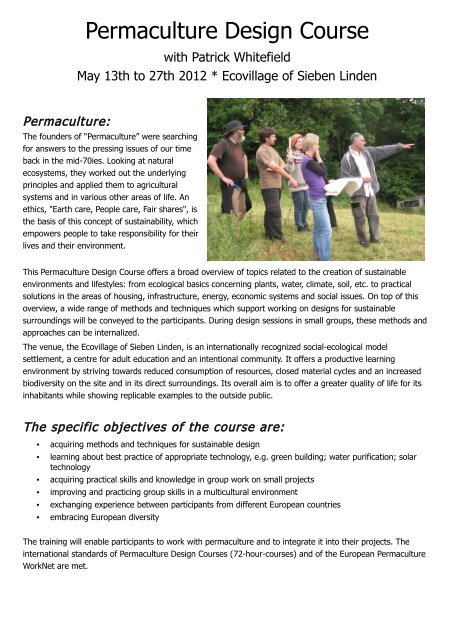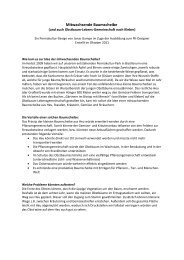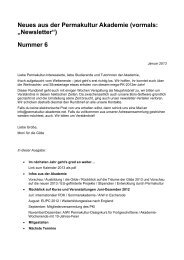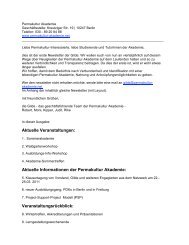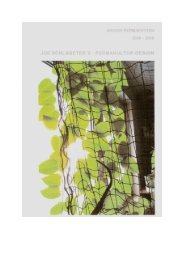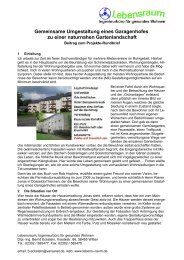Permaculture Design Course - Permakultur-Akademie
Permaculture Design Course - Permakultur-Akademie
Permaculture Design Course - Permakultur-Akademie
Create successful ePaper yourself
Turn your PDF publications into a flip-book with our unique Google optimized e-Paper software.
<strong>Permaculture</strong> <strong>Design</strong> <strong>Course</strong><br />
with Patrick Whitefield<br />
May 13th to 27th 2012 * Ecovillage of Sieben Linden<br />
<strong>Permaculture</strong>:<br />
The founders of “<strong>Permaculture</strong>” were searching<br />
for answers to the pressing issues of our time<br />
back in the mid-70ies. Looking at natural<br />
ecosystems, they worked out the underlying<br />
principles and applied them to agricultural<br />
systems and in various other areas of life. An<br />
ethics, "Earth care, People care, Fair shares", is<br />
the basis of this concept of sustainability, which<br />
empowers people to take responsibility for their<br />
lives and their environment.<br />
This <strong>Permaculture</strong> <strong>Design</strong> <strong>Course</strong> offers a broad overview of topics related to the creation of sustainable<br />
environments and lifestyles: from ecological basics concerning plants, water, climate, soil, etc. to practical<br />
solutions in the areas of housing, infrastructure, energy, economic systems and social issues. On top of this<br />
overview, a wide range of methods and techniques which support working on designs for sustainable<br />
surroundings will be conveyed to the participants. During design sessions in small groups, these methods and<br />
approaches can be internalized.<br />
The venue, the Ecovillage of Sieben Linden, is an internationally recognized social-ecological model<br />
settlement, a centre for adult education and an intentional community. It offers a productive learning<br />
environment by striving towards reduced consumption of resources, closed material cycles and an increased<br />
biodiversity on the site and in its direct surroundings. Its overall aim is to offer a greater quality of life for its<br />
inhabitants while showing replicable examples to the outside public.<br />
The specific objectives of the course are:<br />
<br />
<br />
<br />
<br />
<br />
<br />
acquiring methods and techniques for sustainable design<br />
learning about best practice of appropriate technology, e.g. green building; water purification; solar<br />
technology<br />
acquiring practical skills and knowledge in group work on small projects<br />
improving and practicing group skills in a multicultural environment<br />
exchanging experience between participants from different European countries<br />
embracing European diversity<br />
The training will enable participants to work with permaculture and to integrate it into their projects. The<br />
international standards of <strong>Permaculture</strong> <strong>Design</strong> <strong>Course</strong>s (72-hour-courses) and of the European <strong>Permaculture</strong><br />
WorkNet are met.
<strong>Course</strong> content:<br />
<br />
<br />
<br />
<br />
<br />
<br />
<br />
<br />
<br />
<br />
Introduction to permaculture: Ethics and philosophy, permaculture principles; Patterns, energies,<br />
systems in permaculture<br />
Introduction to design concepts; Methods for observation and analysis: Basemap, Sectoring, Input-<br />
Output-analysis<br />
Planning methods: Data Overlay, Zoning,...<br />
Principles, patterns and components of ecosystems ; Trees and other plants; Soil and climate; Water;<br />
Animals<br />
<strong>Permaculture</strong> aspects in the Ecovillage of Sieben Linden<br />
Architecture; Ecological infrastructure; Planning ecological settlements<br />
Social permaculture<br />
Economy and organisational design<br />
<strong>Design</strong>work in groups & Presentation of designs<br />
Next steps<br />
Methodology:<br />
The course will be designed so that all spheres of human beings are satisfied: the mind, the body and the<br />
soul. Thus there will be a great diversity of methods, for theoretical inputs as well as for practical work and<br />
forming of a group.<br />
Methods and techniques of the theoretical part will include: slide shows, movies, lectures, work small groups,<br />
action learning processes, self-exploration, scripts, guided tours, etc.<br />
The practical part will both work with individual and group work on one or several design tasks, where<br />
participants practice the various methods that are taught in the theory-sessions. Practical work is also offered<br />
in hands-on-projects (like building a composting toilet or setting up a sheet-mulch-bed).<br />
The formation of a group will be supported by a number of methods that have been tried in social fields, for<br />
example dialogues and forum.<br />
Methods of participatory processes (e.g. Open Space) are of course part of this training. Active participation<br />
helps projects to be successful and sustainable due to the recognition and possible inclusion of as many needs<br />
of people as possible.<br />
The course also includes gaining insights into the overall design and appropriate technology as well as the<br />
organisational structure and educational activities of the hosting Ecovillage of Sieben Linden.<br />
This means, the Ecovillage of Sieben Linden will serve as a living example for sustainability and as a field of<br />
practice. The participants will get the opportunity to see and experience ecological and social solutions and to<br />
witness challenges met by the community in their process of setting up a sustainable human settlement.
The team:<br />
Diversity is important to us, so we apply this permaculture principle to the composition of our teaching teams. This time,<br />
we are delighted to welcome Patrick Whitefield as the main teacher of this course! Both Sandra Campe and Beate<br />
Walsdorff will work alongside him as teachers and facilitators. On top of this, Tomas Remiarz will join the course for some<br />
days, plus various teachers from Sieben Linden Ecovillage.<br />
Here is a little introduction to the main team:<br />
Patrick Whitefield<br />
Patrick is the main tutor on this course. He was brought up on a smallholding and qualified in<br />
agriculture. After several years working in agriculture in the Middle East and Africa, he settled in<br />
central Somerset (UK) where he still lives. He’s always been a vegetable gardener, and some<br />
fifteen years ago he planted an orchard which now gives him an abundant supply of apples from<br />
September to March. In the past he’s made his living by a variety of country crafts, and for a<br />
while he was a prominent member of the Green Party.<br />
Since 1990 he’s devoted himself to permaculture, especially to teaching it, and has appeared on<br />
the BBC2 television programmes (A Farm for the Future). Patrick is now one of the leading<br />
permaculture teachers in Britain, indeed in Europe. He combines a deep knowledge of the<br />
subject with an inspiring and professional teaching style. He’s written several books on permaculture (e.g. The Earth Care<br />
Manual). His latest book is The Living Landscape, how to read it and understand it, a subject especially close to his heart.<br />
Sandra Campe<br />
Sandra has been living in the Ecovillage of Sieben Linden for more than eight years. Before this,<br />
she studied organic agriculture and <strong>Permaculture</strong> has accompanied her throughout these years as<br />
focus and direction.<br />
In Sieben Linden her focus shifted over the years - from practical gardening to settlement design<br />
and participatory processes, for the development of the settlement as well as with young<br />
volunteers. She strongly believes both in the empowering nature of permaculture and in the<br />
potential of (young) people as change agents. Because of this, she started a social structure for<br />
young adults in Sieben Linden Ecovillage and she sends out young volunteers on a learning service to peace projects in<br />
south asia.<br />
After receiving her <strong>Permaculture</strong> Diploma in summer 2008, she started to work as a tutor of students at the German<br />
<strong>Permakultur</strong> <strong>Akademie</strong> and as a teacher of <strong>Permaculture</strong> courses - and is very enthusiastic about it!<br />
Beate Walsdorff<br />
Beate has been practicing permaculture for the last ten years in as different places as New<br />
Zealand, Brazil and Germany. Formally trained in social work, she combined this background with<br />
her permaculture activities while working and living in different permaculture and ecovillage<br />
projects in South America, e.g. the nomadic ecovillage “La Caravana Arcoìris por la Paz”. With La<br />
Caravana she focussed on spreading useful and important tools like group communication,<br />
consensus decision making, community gardening, earth building and permaculture design within<br />
a variety of brazilian communities and regions.<br />
Now, back in Germany, she is especially dedicated to seed saving and bio-regional networking in<br />
the „Lassaner Winkel“, a region in the very north east of Germany, where she is co-founding a<br />
permaculture based community project. For the past three years she has been a regular co-teacher and facilitator within<br />
the educational programmes of Sieben Linden Ecovillage.<br />
Tomas Remiarz<br />
Tomas has practised permaculture since 1995, and taught permaculture courses in several<br />
European countries since 1998. He has extensive experience in working with urban and rural<br />
communities, and worked on bioregional reforestation of the British uplands for several years.<br />
Since 2006, he has been travelling around Britain and Europe, giving practical and design support<br />
to permaculture and other projects. Apart from this and teaching courses, he is currently involved<br />
in setting up a rural intentional community, and developing a permaculture research network.
General information:<br />
Dates: May 13th-27th, 2012<br />
Venue:<br />
<strong>Course</strong> costs:<br />
Ecovillage of Sieben Linden, Saxony-Anhalt, North-east Germany (broadly between<br />
Hamburg, Hannover and Berlin), www.siebenlinden.de<br />
1.478,- Euro, including all costs (Please note „funding options“ below)<br />
=> <strong>Course</strong> fee: 750,- Euro<br />
=> Accommodation and food: 728,- Euro (accommodation in rooms for 2-3 people;<br />
food is 100% organic and vegetarian / vegan)<br />
Funding options:<br />
<br />
non-german EU-residents:<br />
The course is listed in the Grundtvig-Comenius course database, under the EU's „Lifelong<br />
Learning program“. This means: FULL FUNDING is available for eligible non-German EU residents<br />
for full board, accommodation, course fees and transport cost.<br />
You will find the course in the database at:<br />
http://ec.europa.eu/education/trainingdatabase (search for "<strong>Permakultur</strong> Institut")<br />
For instructions on how to apply for Grundtvig-funding:<br />
http://ec.europa.eu/education/trainingdatabase/instructions%20for%20applying-EN.doc<br />
To find your own country's National Agency for the „Lifelong Learning Programme“ of the EU, please go to:<br />
http://ec.europa.eu/education/lifelong-learning-programme/doc1208_en.htm<br />
We will provide more information on how to apply for funding once you got in touch with us.<br />
PLEASE NOTE: THE DEADLINE FOR<br />
GRUNDTVIG FUNDING APPLICATIONS IS<br />
JANUARY 16th, 2012!!!<br />
<br />
german residents:<br />
German residents can apply for a „Bildungsprämie“, which will cover part of the course costs.<br />
others:<br />
If you have questions about the funding or if you are not eligible for funding and the price means a<br />
restriction to you, please get in touch with Beate Walsdorff: sementeviva@gmail.com. She will<br />
answer your questions and help to work out a solution.<br />
Registration:<br />
You will find the course online at:<br />
www.siebenlinden.de/htmcontent2114.html<br />
To register for the course, click „Anmelden“. To obtain answers to questions, press „Frage stellen“.<br />
The course is open to everyone (depending on availability of space)!


